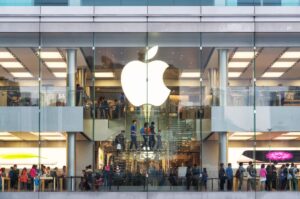 For at least the ten years since the launch of the original iPhone, Apple has enjoyed brand loyalty the depth of which few companies have ever attained – indeed, so loyal are Apple’s legions of “fanboys” (and fangirls, of course) that the company has become nearly synonymous with the very idea of brand loyalty. With the today’s impending launch of a new iPhone topping the $1,000 mark, analysts are now wondering if Apple will test, if not breach, the limits of that loyalty. Is there still enough tensile strength in the Apple brand to absorb the sticker shock of the new iPhone? Apple watchers will soon find out.
For at least the ten years since the launch of the original iPhone, Apple has enjoyed brand loyalty the depth of which few companies have ever attained – indeed, so loyal are Apple’s legions of “fanboys” (and fangirls, of course) that the company has become nearly synonymous with the very idea of brand loyalty. With the today’s impending launch of a new iPhone topping the $1,000 mark, analysts are now wondering if Apple will test, if not breach, the limits of that loyalty. Is there still enough tensile strength in the Apple brand to absorb the sticker shock of the new iPhone? Apple watchers will soon find out.
By Rick Ferguson
Way back in ancient times – that is, the 1950’s – McDonald’s franchisee mastermind Ray Kroc defined the four fundamental drivers of customer loyalty using the acronym QSCV for Quality, Service, Cleanliness (what we would now refer to as “customer experience”) and Value. That is, Kroc understood that if he could sell a quality hamburger, with a smile, in a pleasant environment, and at a decent price – and if he could deliver on these four drivers better than his competitors – then McDonald’s would build a loyal customer base. Today, any business that hopes to build customer loyalty must execute on these four drivers at least as well as the competition – fall short on any one of them, and you won’t be in business long.
It is possible, however, to differentiate your brand by emphasizing one or more of these drivers over the others. So has Apple become the world’s most valuable brand by emphasizing the innovative quality of its products so successfully that it is able to charge a price premium for those products far above what their competitors can offer. Apple isn’t the market leader in smartphone sales; they control only about 13 percent of the market, versus market leader Samsung’s 20 percent. But Apple is the most profitable maker of smartphones – its profit margins are estimated at around 46 percent – and those profits are driven entirely by its legions of loyal customers willing to pay a premium for its products.
With the launch of its new $1,000 price point, however, analysts are watching closely to determine if there is a limit to Apple’s customer loyalty. The phone is expected to offer such innovative features as infrared 3D facial recognition – but will those new features provide enough excitement to convince Apple fans to line up outside Apple’s retail stores to buy it? Some analysts aren’t so sure. Money quote from the New York Times:
"'It's a whole new threshold,' said Debby Ruth, a senior vice president at the tech consulting firm Frank N. Magid Associates. I really do think it's going to make people pause.' From the iPhone's introduction a decade ago, Apple has always priced it as a premium product - a more refined and polished alternative to the legions of cheaper smartphones available in the market. But this time, the company is pushing into luxury territory. The new phone will cost as much as the company's entry-level MacBook Air laptop. 'They're doubling down on their strategy: They are going much more to the high end,' Ms. Ruth said."
As the Times points out, so far investors seem to be backing Apple’s play, as its stock has risen by nearly 50 percent over the past year in anticipation of the new iPhone launch. A recent survey by Creative Strategies and Survey Monkey is likewise loaded with good news for Apple, as these stats point out:
- 21% of current iPhone owners are planning to upgrade within the next six months and another 17% within the next year.
- When only looking at consumers who indicated they are extremely interested in the iPhone 8, intention to upgrade increases to 36% within six months and 24% within the next year.
- 56% of early tech adopters said they are either extremely or very interested in the new iPhone.
- 34% of current iPhone users said they are either extremely or very interested in the iPhone 8.
- Among smartphone owners planning to upgrade in the next six months, 44% are either extremely or very interested in the iPhone 8.
- 57% of consumers who said they were extremely interested also stated they are extremely or very likely to buy.
If borne out by actual sales, those numbers represent a lot of lucre for Apple. As for price sensitivity, the survey does highlight some concern, as 33 percent of current iPhone owners saying they would probably not buy the new iPhone if it were too expensive. Factor in international sales, and the picture becomes more complicated: iPhones are still generally viewed as hot status symbols in emerging markets such as Brazil and China, but consumers often start with cheaper alternatives while maintaining aspirational loyalty to Apple.
There a few other mitigating factors as well; rumored component shortages may mean that Apple fans will have to join a long waiting list to receive their new phones, which could impact early sales. Still, the smart money appears to back Apple as it maintains its strategy – which, depending on your bias, consists of either a) delivering premium products that its customers are willing to pay for; or b) continuing to soak gullible Apple fanboys. We’ll continue to monitor the outcome for you.
And, by way of full disclosure: my iPhone 7 Plus will continue to serve me well – but I reserve the right to upgrade if the new iPhone is mind-blowing enough.
Rick Ferguson is Editor in Chief of the Wise Marketer Group and is a Certified Loyalty Marketing Professional (CLMP).




